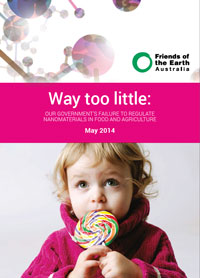| May 22, 2014 | |
FOE publishes new report on widespread presence of nanomaterials in our food chain |
|
| (Nanowerk News) Friends of the Earth's new report, "Way too little", looks at the now widespread presence of nanomaterials in our food chain and how little Food Standards Australia New Zealand (FSANZ) is doing to ensure our safety. | |
| Here is the introduction section of the new report: | |
 "This report will examine the changes since our 2008 report ("Nanotechnology in food and agriculture") including the development of new food, food contact and agricultural products. It will review the current literature relating to the potential environmental, health and safety impacts associated with nanotechnology and summarise the Australian regulatory responses to date. This updated report uncovers the: – accelerating rate of commercialisation and rapidly increasing number of commercial products containing nanomaterials in the food and agricultural sectors; – lack of information regarding which nanomaterials have been released and the likely exposure of humans and natural systems to these materials; – lack of basic steps to allow us to track nanomaterials that have been released, such as labelling and a register of products containing nanomaterials; |
|
| – growing gap between the pace of commercialisation and environmental, health and safety assessments; | |
| – increasingly large body of peer reviewed evidence that certain nanomaterials may cause harm to human health or the environment; | |
| – failure of regulators to respond to the growing evidence of risks; | |
| – lack of basic knowledge that is critical in order to fully analyse the particular environmental, health and safety issues associated with nanotechnology. | |
| Six years ago, inaction was based on a perceived lack of data. Inaction is still the norm but that is no longer an excuse our Government can use. Scientists and scientific bodies such as the US National Research Council have given us more than enough evidence to justify a pro-active regulatory regime and a properly funded R&D program that will effectively target those areas of greatest environmental and health concern. | |
| Unfortunately, our Federal Government seems unwilling to provide the levels of funding required for such work or to adopt appropriate regulation. The notion of precaution has been replaced with an attitude that it is the obligation of industry to determine whether their products are safe and regulators will only act when harm is shown. While France, Belgium and Denmark are implementing a mandatory register for nanomaterials and the EU’s is in the process of implementing a nano food labelling regime, Australian consumers remain in the dark. | |
| This needs to change." |
| Source: Friends of the Earth |
